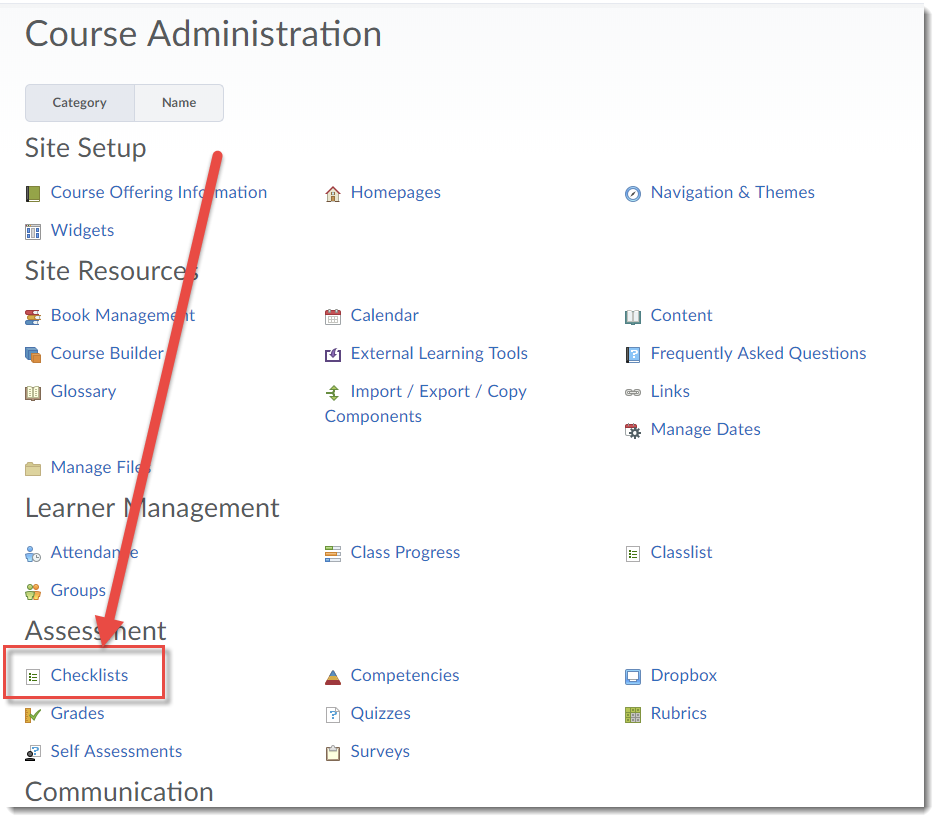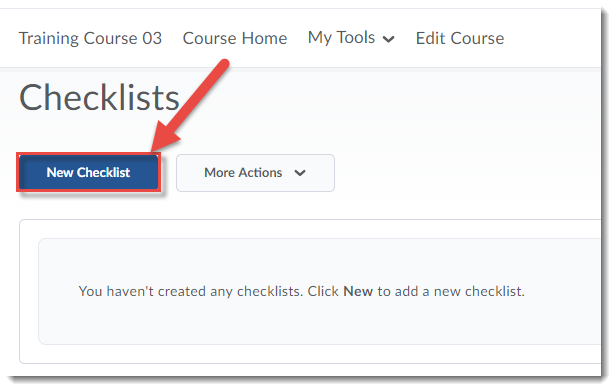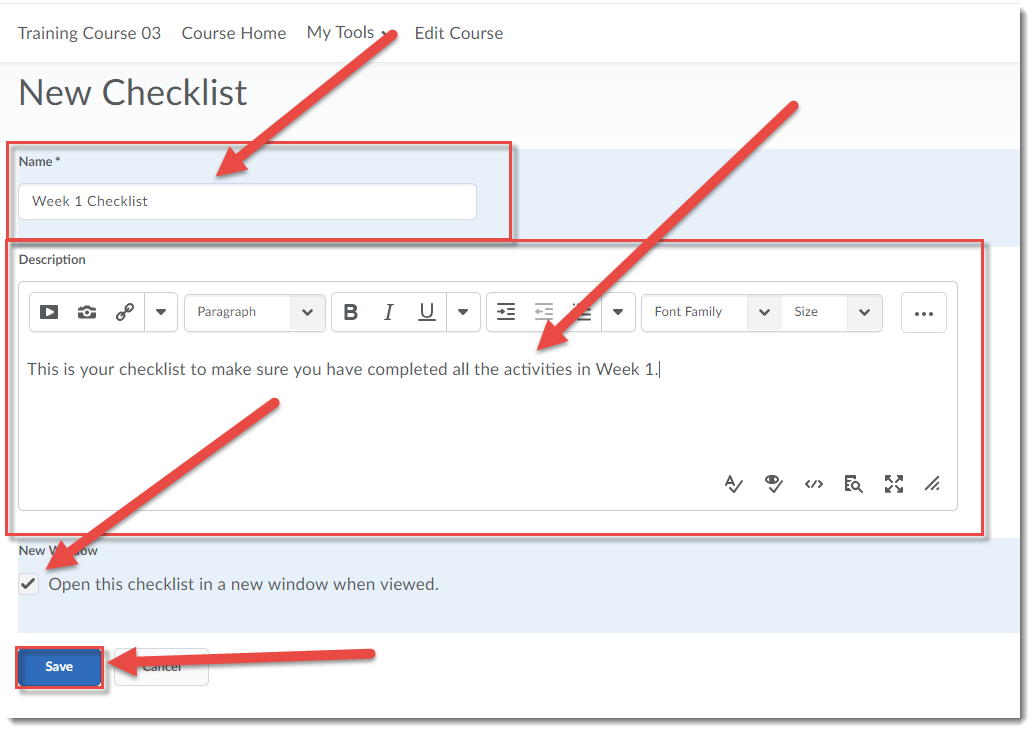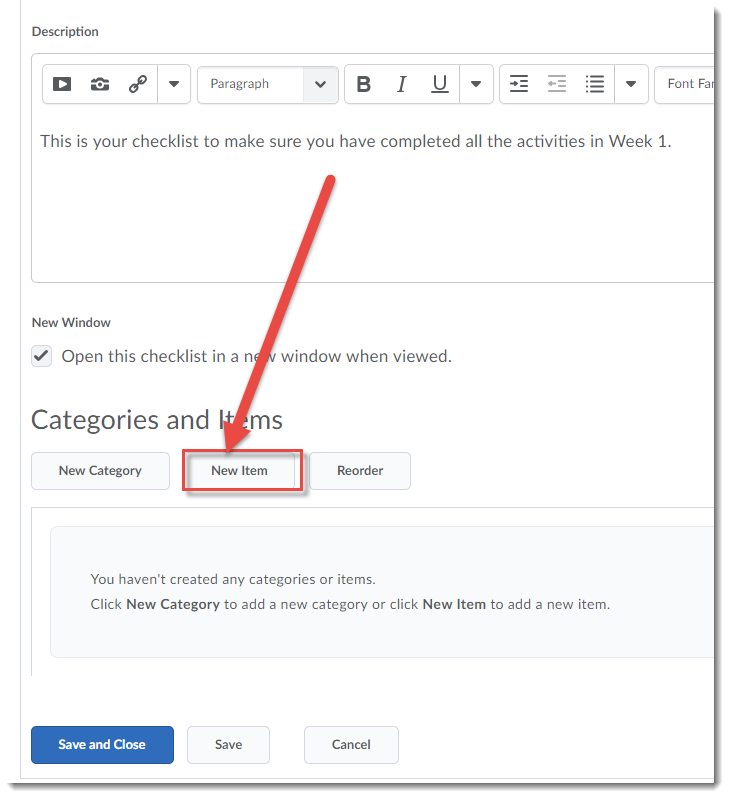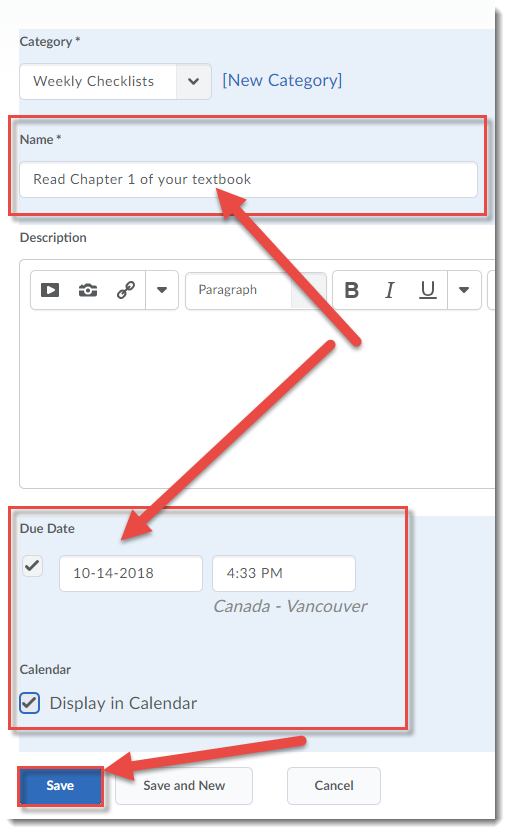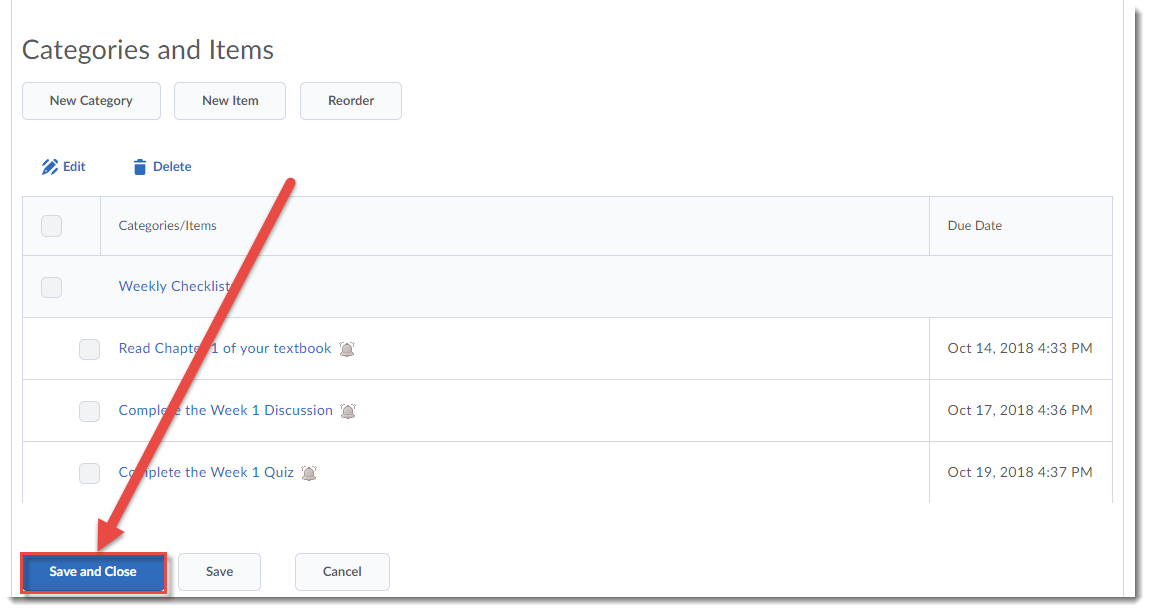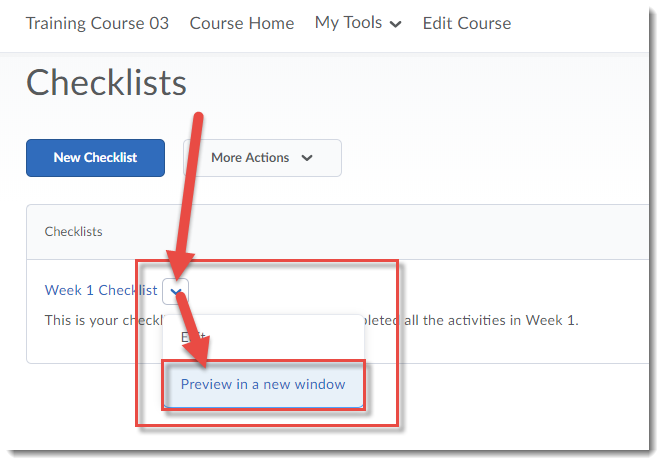Here is my assignment 2 for the Creative Commons certificate: The Law that we call Copyright!
Category: Uncategorised
Once upon a time…the Tale of how Creative Commons came to be
I am currently taking, and getting close to finishing, the Creative Commons certificate course, and as part of this course have been writing blog posts for my assignments on my own blog site. So, I thought I would share some of these with you so you can also learn a bit about Creative Commons, what it is, what it does, and many other exciting and interesting things!
And, without further ado: Once upon a time…the Tale of how Creative Commons came to be !
BCcampus’ Festival of Learning (and Call for Proposals)
Some of you have heard of, and maybe attended, BCcampus’ Festival of Learning in the past. It happens every 2 years, and I am excited to let you know that the 2020 Festival of Learning’s Call for Proposals is up and ready for you to submit to!
The Festival will take place May 11-13, 2020 at The Pinnacle Hotel Harbourfront in downtown Vancouver, and this year’s theme is all about Disruption and Transformation in Higher Education.
To find out more, and submit your proposal, go to Festival of Learning Call for Proposals (https://festival.bccampus.ca/call-for-proposals/) – deadline is November 15th.
eLearning Workshops, Drop-ins, Booking Appointments, and Support Reminders
We wanted to remind you that if you need any help setting up your D2L course sites, or have any questions now or during the term about D2L or how to use (or why you might want to use) any of its functions, or about the other tools we support, such as Kaltura and Blackboard Collaborate Ultra (BBCU), we are here for you!
Our eLearning Support team is available for faculty and students from 8:30-4:30, Monday-Friday by phone (250-370-3488) or by email (desupport@camosun.ca) or even by in-person in the Centre for Excellence in Teaching and Learning (CETL) offices in the Lansdowne Library.
We also have 5 instructional designers who are available to help you by appointment at both campuses, or during our eLearning drop-ins at Interurban. These drop-ins, in our CETL offices in the Liz Ashton Campus Centre, room 251J, are:
September
- Tuesdays, September 3, 10, 17, 24, from 11:00-12:00pm
- Thursdays, September 5, 12, 19, 26, from 11:00-12:00pm
- Fridays, September 6, 13, 20, 27, from 11:30am-12:30pm
October 4 to December 13
- Fridays, from 11:30am-12:30pm
If you would like to contact an instructional designer to schedule a consult regarding a specific question you are having around using D2L, Kaltura, or BBCU, or for information on how to use a specific D2L tool, or with any questions you may have about using other educational technologies to support your teaching (or even if you have a pedagogical challenge and are wondering what educational technology might help you with your challenge), contact eLearning support (desupport@camosun.ca) and we can set you up!
You can also find out more about who is available to help you with your eLearning needs by visiting the Contact Us section of the main CETL website (http://camosun.ca/about/teaching-learning/contact-us.html) and email an instructional designer directly.
Finally, we also have a number of workshops scheduled at Interurban campus this fall. Lansdowne workshops will be scheduled later this month. Check out descriptions below, and register at our Survey Monkey form.
Setting up Your Gradebook
Date & Time: Friday, September 13 from 10-11:30am
Location: LACC 251J, Interurban Campus
Description: This hands on workshop will focus on setting up your Gradebook from start to finish. Please bring your course outline (or a breakdown of your assessment items) if you wish to build your own Gradebook during the workshop.
Managing Groups in D2L
Date & Time: Friday, September 20 from 10-11:30am
Location: LACC 251J, Interurban Campus
Description: This workshop will provide an overview of how to create and manage groups in D2L. A demonstration of how to create private group discussions and group assignment folders will be provided.
Building Quizzes in D2L
Date & Time: Friday, September 27 from 10-11:30am
Location: LACC 251J, Interurban Campus
Description: This workshop will explore ways to create, customize and grade quizzes. We’ll also tackle creating Question Pools and how to organize your questions in the Question Library.
Managing Assignments
Date & Time: Friday, October 4 from 10-11:30am
Location: LACC 251J, Interurban Campus
Description: The Assignment tool in D2L enables students to submit assignments while streamlining the grading process for instructors. This workshop provides hands-on practice creating, managing and grading assignments.
Getting Started with Kaltura (Streaming Media Service)
Date & Time: Friday, October 11 from 10-11:30am
Location: LACC 251J, Interurban Campus
Description: Kaltura is Camosun College’s streaming media service that integrates into D2L. This means faculty and students now have a place to create, edit, and house their course-related videos. Kaltura also integrates with D2L.Come find out more about what Kaltura is, what it can do, and how you can use it for your courses. Bring a laptop to the session if you have one.
Connecting with Your Students in Real-time
Date & Time: Friday, October 25 from 10-11:30am
Location: LACC 251J, Interurban Campus
Description: Blackboard Collaborate Ultra is Camosun’s web conferencing tool. Whether you teach face-to-face, blended, or online, this tool can help you increase instructor-student and student-to-student engagement. Come find out more about how you can connect with learners synchronously. This session requires you bring a laptop to participate.
Managing Final Grades in D2L
Date & Time: Friday, December 13, 10-11:30
Location: LACC 251J, Interurban Campus
Description: It’s grading time again! This workshop is designed to provide a quick refresher on how to input and manage grades in D2L. An overview of how to apply grade schemes and release calculated and adjusted final grades will also be provided.
We look forward to hearing from you!
Don’t forget we have eLearning drop-ins and consults
Happy new term from eLearning at Camosun!
We wanted to remind you that if you need any help setting up your D2L course sites, or have any questions now or during the term about D2L or how to use (or why you might want to use) any of its tools, we are here for you!
Our eLearning (D2L and other tools) Support team is available from 8:30-4:30, Monday-Friday by phone (250-370-3488) or by email (desupport@camosun.ca) or even by in-person in the Centre for Excellence in Teaching and Learning (CETL) offices in the Lansdowne Library. And they are available for your students to, so be sure to direct them to eLearning Support if they have technical issues with D2L (like logging in!)
We also have 5 instructional designers who are available to help you by appointment at both campuses, or during our eLearning drop-ins at Interurban. These drop-ins, in our CETL offices in the Liz Ashton Campus Centre, room 251J, are:
August
- Tuesday, August 27, from 2:00pm-3:00pm
- Wednesday, August 28, from 1:00pm-2:00pm
- Thursday, August 29, from 2:00pm-3:00pm
- Friday, August 30, from 11:30am-12:30pm
September
- Tuesdays, September 3, 10, 17, 24, from 11:00-12:00pm
- Thursdays, September 5, 12, 19, 26, from 11:00-12:00pm
- Fridays, September 6, 13, 20, 27, from 11:30am-12:30pm
October 4 to December 13
- Fridays, from 11:30am-12:30pm
If you would like to contact an instructional designer to schedule a consult regarding a specific question you are having around using D2L, or for information on how to use a specific D2L tool, or with any questions you may have about using other educational technologies to support your teaching (or even if you have a pedagogical challenge and are wondering what educational technology might help you with your challenge), contact eLearning support (desupport@camosun.ca) and we can set you up!
You can also find out more about who is available to help you with your eLearning needs by visiting the Contact Us section of the main CETL website (http://camosun.ca/about/teaching-learning/contact-us.html) and email an instructional designer directly.
We look forward to hearing from you – and good luck with your term!
eLearning Interurban Workshops for Fall
We are starting to plan our fall training, and have some Interurban workshops up and ready to register for! Lansdowne workshop listings will be posted in August once everyone is back and raring to go for Fall!
Check out descriptions below, and register at our Survey Monkey form.
D2L Overview
Date & Time: Tuesday, August 27 from 10-11:30am; Thursday, August 29 from 10-11:30am
Location: LACC 251J, Interurban Campus
Description: This workshop will provide instructors with an overview of the essential teaching tools available in our learning management system, D2L (also known as Brightspace). Whether you are supplementing your face-to-face classes, transition from using a basic course website or simply want to learn more about to enhance your current teaching practice using D2L, this workshop has a little something for everyone. Come explore the possibilities!
Course Tune-up
Date & Time: Wednesday, August 28 from 10-11:30am
Location: LACC 251J, Interurban Campus
Description: This workshop will focus on setting up your course for Day 1. We’ll cover copying course components and customizing your homepage, widgets and navigation bar. We’ll all show you how to manage release dates associated with your content, discussions, assignments, grades, news and quizzes – from one central location in D2L.
Setting up Your Gradebook
Date & Time: Friday, September 13 from 10-11:30am
Location: LACC 251J, Interurban Campus
Description: This hands on workshop will focus on setting up your Gradebook from start to finish. Please bring your course outline (or a breakdown of your assessment items) if you wish to build your own Gradebook during the workshop.
Managing Groups in D2L
Date & Time: Friday, September 20 from 10-11:30am
Location: LACC 251J, Interurban Campus
Description: This workshop will provide an overview of how to create and manage groups in D2L. A demonstration of how to create private group discussions and group assignment folders will be provided.
Building Quizzes in D2L
Date & Time: Friday, September 27 from 10-11:30am
Location: LACC 251J, Interurban Campus
Description: This workshop will explore ways to create, customize and grade quizzes. We’ll also tackle creating Question Pools and how to organize your questions in the Question Library.
Managing Assignments
Date & Time: Friday, October 4 from 10-11:30am
Location: LACC 251J, Interurban Campus
Description: The Assignment tool in D2L enables students to submit assignments while streamlining the grading process for instructors. This workshop provides hands-on practice creating, managing and grading assignments.
Getting Started with Kaltura (Streaming Media Service)
Date & Time: Friday, October 11 from 10-11:30am
Location: LACC 251J, Interurban Campus
Description: Kaltura is Camosun College’s streaming media service that integrates into D2L. This means faculty and students now have a place to create, edit, and house their course-related videos. Kaltura also integrates with D2L.Come find out more about what Kaltura is, what it can do, and how you can use it for your courses. Bring a laptop to the session if you have one.
Connecting with Your Students in Real-time
Date & Time: Friday, October 25 from 10-11:30am
Location: LACC 251J, Interurban Campus
Description: Blackboard Collaborate Ultra is Camosun’s web conferencing tool. Whether you teach face-to-face, blended, or online, this tool can help you increase instructor-student and student-to-student engagement. Come find out more about how you can connect with learners synchronously. This session requires you bring a laptop to participate.
Managing Final Grades in D2L
Date & Time: Friday, December 13, 10-11:30
Location: LACC 251J, Interurban Campus
Description: It’s grading time again! This workshop is designed to provide a quick refresher on how to input and manage grades in D2L. An overview of how to apply grade schemes and release calculated and adjusted final grades will also be provided.
Universal Design for Learning conference at Royal Roads University!
The Third Pan-Canadian Conference on UDL will take place at Royal Roads University October 2- 4, 2019. This is an amazing opportunity for people working in Universal Design for Learning (UDL), wanting to connect with some of the leaders in the field, or wanting to find out more about UDL and what it might mean for their teaching and learning. Early bird registration is available until the end of this month, so check it out – I hope to see you there!
Rather than repeat everything on the conference website, I am simply going to give you the link to it here.
https://udlcanada.ca/index.html
Flipping Out over the Flipped Classroom workshop summary
Our Flipping Out over the Flipped Classroom workshop is co-facilitated by members of eLearning and Faculty Development (both units in our Centre for Excellence in Teaching and Learning unit). It’s one of my favourite workshops to facilitate, partly because it’s a workshop about flipping, which is itself flipped!
One thing faculty quickly realize when they get our reminder email about the workshop (one week in advance of the face-to-face component), and the instructions for how to access the online component of the workshop (which they MUST complete before the face-to-face component…and yes, I have turned people away if they don’t complete it!), is how challenging it is to be self-directed enough to complete activities before coming to the face to face class. And this is what I love most about this workshop – it puts the faculty in the shoes of their students, making them think about why they would flip their classes, and how to encourage students to engage outside of the classroom.
While this time we didn’t have to turn anyone away, several of the attendees noted that they had put off completing the activities until the last minute. It was a good first discussion as we did our initial check-in around the online component. It was great that everyone ‘fessed up!
After checking in around the online experience, we engaged the participants around the readings they were to have completed, compiling a list of pros/benefits and cons/challenges of flipping the classroom, as well as some ideas for mitigating some of the challenges. This time around, here is what participants came up with:
Pros/Benefits of Flipping the Classroom
- Active learning
- Less boredom
- Controlled pacing
- Relevance: learning comes to life
- Addresses multiple learning styles
- Moving up Bloom’s, can get multiple perspectives to unpack in safe environment
- Encourages critical thinking
- Students are more likely to come prepared
- More engagement with content – “it sticks”
Cons/Challenges of Flipping the Classroom
- The time it takes an instructor to distill content to the basics, and develop material
- Need to create small marking rewards (clerical)
- Accountability (for students)
- Students resist – they have ideas about the roles of the student and the instructor
- Students have busy lives, and may lack a good study environment and access (to technology)
- Interest in topic – how to “hook” the students in
Ideas for Mitigating the Cons/Challenges
- Collaboration (between instructors)
- Institutional support
- Sharing resources between/among faculty to mitigate workload
- Scaffolding to mitigate student accountability and resistance (e.g., teaching them how to watch videos)
- Transparency (re: expectations) – why are we doing this?
- Check-in with students re: their resources, (safe) space, etc.
- Create more learning commons on campus
- Find out what’s available to students and let them know
- Advocate for more resource and support access (evenings, weekends) – writing and learning skills, etc.
- Scalability – do one thing
- Create guides for new/term/sessional faculty – shared resources
- Use flipped activities as formative feedback
We integrate a bit of a lecture into the workshop, discussing how flipping can maximize effectiveness of teaching using Bloom’s taxonomy as a guide. But the real fun in the workshop comes with the Troika Consulting (one of my favourite Liberating Structures activities) where participants work in small groups to get advice on ideas for flipping components of their classes, or for challenges they have faces when flipping. We always mix the groups so they are working with people NOT in their School or discipline, so they can have the joy of discovering new ideas and suggestions.
Main takeaways
- Networking and sharing and collaborating as a flipped activity and to create flipped activities
- Don’t need to flip a whole class – can flip a topic or an activity
- I am not alone – can pull on resources around the college (colleagues, etc.)
- Need more opportunities for multi-disciplinary things – hear different kinds of creativity when not too silo’ed
- Don’t always have to be f2f – web lunch meetings – Community of Practice and sharing what they’ve tried and make suggestions – ongoing opportunities?
- Finding help when you need it is a challenge sometimes – when trying something – need ongoing connection and conversation
- Is there research that shows flipping works better with certain audiences, topics, etc.?
- Doesn’t have to be everything, and it’s not just about technology
- You need to be prepared!
- It takes courage and preparation
- Flipping as a Program approach – built into all courses with support for all faculty, collaboratively created activities/resources, build it in gradually so students understand its value
What I was happy to see this time was an emphasis on the collaborative and programmatic approach to flipping, so it is not just one instructor in isolation. When all instructors in a program are flipping, students get used to it, they potentially will engage more, and see the benefits. Something to think about in the grand scheme of things at our institution!
If you are interested, I am including links to the resources participants were required to read/view during the online component of the workshop. If you have questions or comments, please post them here!
- Video #1: The flipped classroom model: (3 min) https://www.youtube.com/watch?v=ojiebVw8O0g
- Video #2: Showing the Differences between a Traditional and a Flipped Classroom (7 min) https://www.youtube.com/watch?v=ojiebVw8O0g
- Video #3: The Flipped Classroom Podcast: What is the flipped classroom?(4.5 min) https://www.youtube.com/watch?v=RUUaC-gyDpY
- Video #4: What is a flipped classroom? (1 min) https://www.youtube.com/watch?v=r2b7GeuqkPc
- Flipping the Classroom (Center for Teaching, Vanderbilt University): https://cft.vanderbilt.edu/guides-sub-pages/flipping-the-classroom/
- In-class activities and assessment for the flipped classroom: https://uwaterloo.ca/centre-for-teaching-excellence/teaching-resources/teaching-tips/lecturing-and-presenting/delivery/class-activities-and-assessment-flipped-classroom
- Benefits of Flipped Classrooms, at http://guides.library.utoronto.ca/c.php?g=448614&p=3552449
- Making Our Teaching Efficient: Flipping the Classroom: https://tomprof.stanford.edu/posting/1463
- Incorporating Active Learning by Flipping the Classroom: https://www.stthomas.edu/media/lyris/facultydevelopment/IncorporatingActiveLearningByFlippingClassroom.pdf
eLearning Workshops Week of May 27th
And now, here is a list of the workshops we are offering next week. You can register for these, and all our workshops, at https://www.surveymonkey.ca/r/B7KYD8P If you have any questions, email me, Emily, at schudele@camosun.ca.
Lansdowne Workshops
Getting Started with Readspeaker/TextAid in D2L: Thursday, May 30, 2:00-4:00pm, Lansdowne, Ewing 100
- ReadSpeaker offers text-to-speech solutions for websites, online course materials, e-books and digital documents. In this session, we will introduce you to the collection of ReadSpeaker tools we now have available within D2L courses and show you how you and your students can use and access these tools.
Getting Started with ePortfolio in D2L: Friday, May 31, 10:00am-12:00pm, Lansdowne, Ewing 110
- Looking for options for your students to collect and share documents, assessments, presentations, etc. with other students and faculty across their Program? Come find out how ePortfolio in D2L might support you!
Interurban Workshops
Exploring Different Ways to Use Rubrics: Thursday, May 30, 10:00-11:30am, LACC235
- Come learn how you can streamline your assessment strategy, communicate expectations and feedback for your learners while also building in quality assurance measures and cutting down on manual marking. Various examples, lessons learned and planning tips will be shared. Participants will have the opportunity to build or refine a rubric.
Creating a Checklist in D2L
The Checklist is a neat little tool in D2L which you can use to create a list of tasks (for a Module, for a Week, for a Course) that students can check off as they complete them. This tutorial will cover the steps involved in creating a Checklist for your students, and for integration into the Content tool.
Steps
- Go to your course homepage, and click Edit Course.
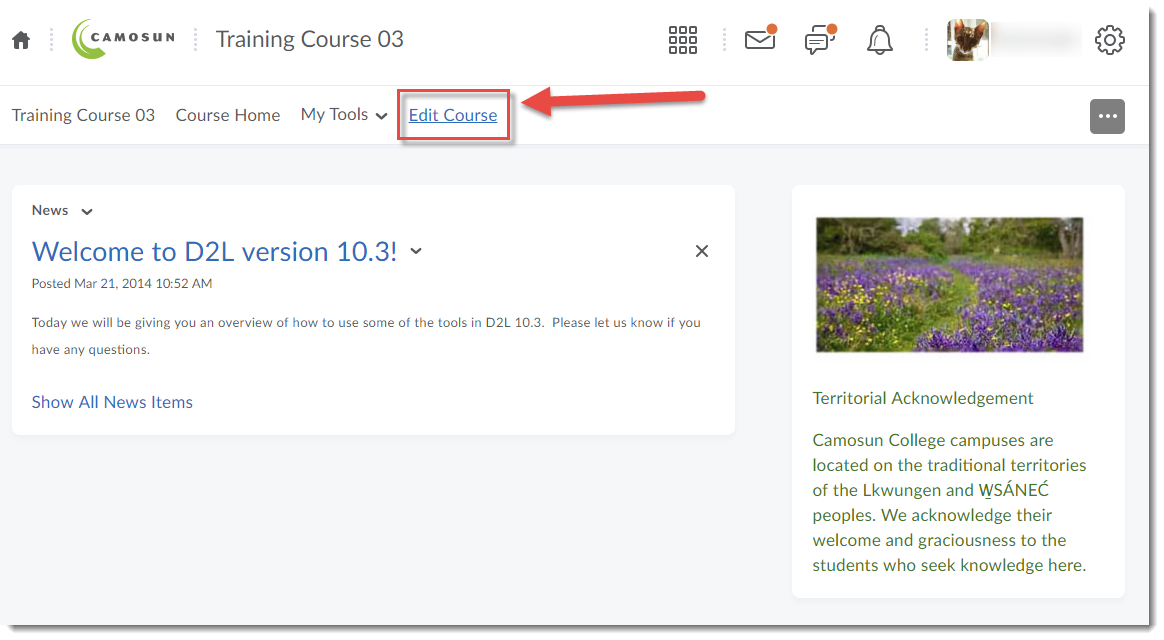
- Click Checklist.
- Click New Checklist.
- Give your Checklist a Name, add a Description if you like. Select Open this checklist in a new window when viewed – this will allow students to have the Checklist open as they complete tasks in the course. Click Save.
- Now you can add tasks (items) to your Checklist. Scroll down, and click New Item to get started.
- Select a Category for your item using the Category drop-down, or create a New Category for it by clicking on New Category. Items MUST be in a category!
- Give your item a Name, and a Due Date if you like. Then click on Save. Click on Save and New if you would like to create another New item.
- Continue adding Items until your Checklist is completed. Click Save and Close.
- Preview your Checklist by clicking on the drop-down menu (down arrow) next to the Checklist’s title and selecting Preview in a new window.
Things to Remember
Once you have created your Checklists, you can either add the Checklist tool link to your Navbar or My Tools drop-down menu, or link to it in Content using Add Existing Activities (see the Adding Links to Activities in Content tutorial for more information).
You can also Reorder your Checklists or Delete them by clicking on the More Actions button in the Checklists tool.

